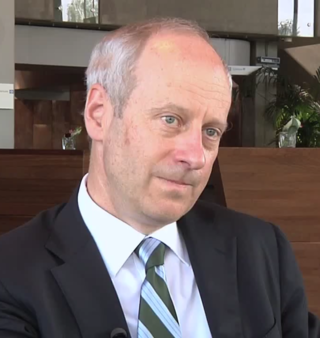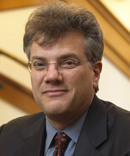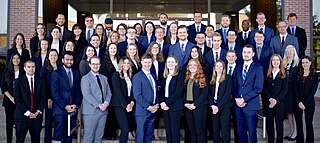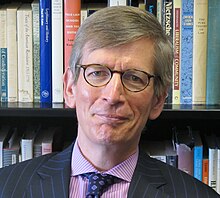
John Bordley Rawls was an American moral,legal and political philosopher in the liberal tradition. Rawls has been described as one of the most influential political philosophers of the 20th century.

The University of Chicago Law School is the law school of the University of Chicago,a private research university in Chicago,Illinois. It employs more than 180 full-time and part-time faculty and hosts more than 600 students in its Juris Doctor program,while also offering the Master of Laws,Master of Studies in Law and Doctor of Juridical Science degrees in law. The law school has the third highest percentage of recent graduates clerking for federal judges after Stanford Law School and Yale Law School.

Michael Joseph Sandel is an American political philosopher and the Anne T. and Robert M. Bass Professor of Government Theory at Harvard Law School,where his course Justice was the university's first course to be made freely available online and on television. It has been viewed by tens of millions of people around the world,including in China,where Sandel was named the 2011's "most influential foreign figure of the year". He is also known for his critique of John Rawls' A Theory of Justice in his first book,Liberalism and the Limits of Justice (1982). He was elected a Fellow of the American Academy of Arts and Sciences in 2002.

Cass Robert Sunstein is an American legal scholar known for his work in constitutional law,administrative law,environmental law,and behavioral economics. He is also The New York Times best-selling author of The World According to Star Wars (2016) and Nudge (2008). He was the administrator of the White House Office of Information and Regulatory Affairs in the Obama administration from 2009 to 2012.

The Volokh Conspiracy is a legal blog co-founded in 2002 by law professor Eugene Volokh,covering legal and political issues from an ideological orientation it describes as "generally libertarian,conservative,centrist,or some mixture of these." It is one of the most widely read and cited legal blogs in the United States. The blog is written by legal scholars and provides discussion on complex court decisions.
Foot voting is expressing one's preferences through one's actions,by voluntarily participating in or withdrawing from an activity,group,or process;especially,physical migration to leave a situation one does not like,or to move to a situation one regards as more beneficial. People who engage in foot voting are said to "vote with their feet".

Frank Isaac Michelman is an American legal scholar and the Robert Walmsley University Professor Emeritus at Harvard Law School.
Constitutional theory is an area of constitutional law that focuses on the underpinnings of constitutional government. It overlaps with legal theory,constitutionalism,philosophy of law and democratic theory. It is not limited by country or jurisdiction.
Benjamin Charles Zipursky is a Canadian legal scholar and professor at Fordham Law in New York City. He has been interviewed by PBS Newshour,BBC,and The New York Times on the Vioxx wrongful death cases and other torts cases. As an author of the casebook Tort Law:Responsibilities and Redress,he is nationally recognized as a scholar on torts.
The American Society for Political and Legal Philosophy (ASPLP) is a learned society founded in 1955 by political theorist Carl Friedrich. Its aim is to bring together scholars in political science,law,and philosophy who are interested in interdisciplinary exploration of a range of problems in political and legal philosophy. The ASPLP's main activities are to hold an annual conference,on a topic chosen in advance by the membership,and to publish the papers,along with formal commentary and invited additional essays,in Nomos,its yearbook. As Friedrich explained in the Preface to Authority,the first yearbook:"We are calling the series NOMOS,which is the broadest Greek term for law,because in this term there are also traditionally comprised the notions of a basic political order and of customs and a way of life." He continued:"It describes reasonably well,and perhaps better than any term of modern English,what must be the focus of a society such as ours,uniting the several social sciences,law,and philosophy." That commitment to interdisciplinary normative inquiry has characterized the ASPLP and the Nomos series ever since.
Charles R. Beitz is an American political theorist. He is Edwards S. Sanford Professor of Politics at Princeton University,where he has been director of the University Center for Human Values and director of the Program in Political Philosophy. His philosophical and teaching interests focus on global political theory,democratic theory,the theory of human rights and theories of property.

Richard H. Pildes is the Sudler Family Professor of Constitutional Law at the New York University School of Law and a leading expert on constitutional law,the Supreme Court,the system of government in the United States,and legal issues concerning the structure of democracy,including election law. His scholarship focuses on public law and legal issues affecting democracy.

Alessandro Ferrara is an Italian philosopher,professor of political philosophy at the University of Rome Tor Vergata and former president of the Italian Association for Political Philosophy. He also teaches legal theory at Luiss Guido Carli University in Rome.

Justice:What's the Right Thing to Do? is a 2009 book on political philosophy by Michael J. Sandel.
Each fall,the Harvard Law Review publishes a survey of the past Supreme Court term. This is a partial list of legal academics who have contributed a Foreword.
Frederick Schauer is an American legal scholar who serves as David and Mary Harrison Distinguished Professor of Law at the University of Virginia School of Law. He is also the Frank Stanton Professor emeritus of the First Amendment at Harvard University's Kennedy School of Government. He is well known for his work on American constitutional law,especially free speech,and on legal reasoning,especially the nature and value of legal formalism.
Susan Bandes is an American lawyer and the current Centennial Distinguished Professor Emeritus at DePaul University. Bandes is considered one of the 20 most cited law professors in criminal law and procedure.

The Michigan State Law Review is a law review published by students at Michigan State University College of Law. It is the flagship journal of the school and it publishes five issues per year. According to the Washington &Lee Law Journal Ranking,Michigan State Law Review was the 48th highest-ranked flagship legal journal in 2022,a dramatic increase from its ranking of 332rd in 2003. The journal hosts an annual academic conference of global legal experts with past events covering issues such as autonomous vehicles,quantitative legal analysis,civil rights,and intellectual property. Professor David Blankfein-Tabachnick has served as Faculty Advisor of the journal since his appointment in 2016. In 2018,the journal began publishing an annual "Visionary Article Series," which features the work of one prominent legal scholar per year.
Linda McClain is the Robert B. Kent Professor of Law at Boston University School of Law,and was previously the Rivkin Radler Distinguished Professor of Law at Hofstra Law School. McClain's work focuses on family law,sex equality,and feminist legal theory. McClain has written extensively on topics related to family,gender,and constitutional issues.
Jacob T. Levy is an American political theorist and Tomlinson Professor of Political Theory at McGill University. Levy is the Chair of the Department of Political Science at McGill,as well as the coordinator of McGill's Research Group on Constitutional Studies and the founding director of McGill's Yan P. Lin Centre for the Study of Freedom and Global Orders in the Ancient and Modern Worlds. Levy is also a Senior Fellow at the Niskanen Center and the Institute for Humane Studies. He is known for his expertise on multiculturalism,liberalism,and pluralism.










